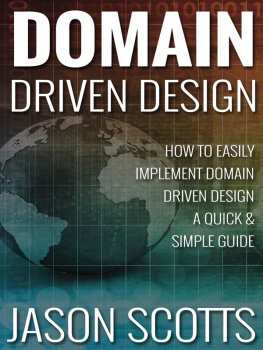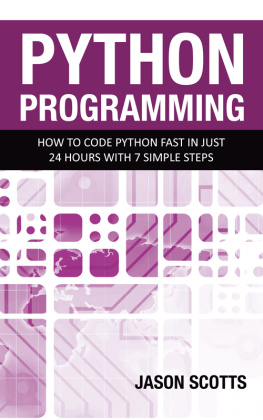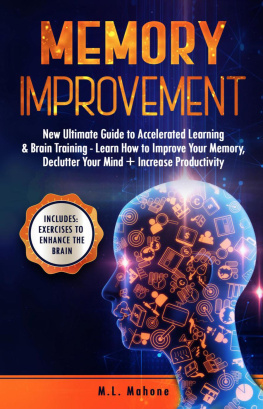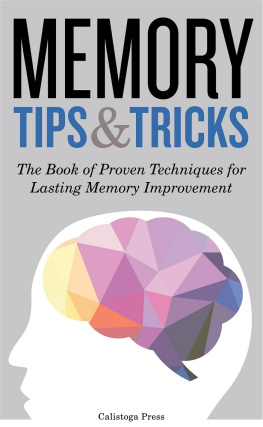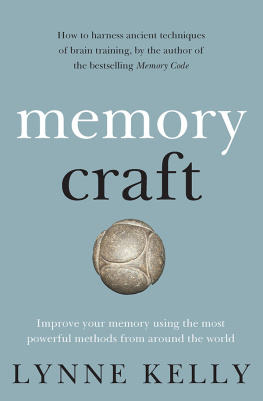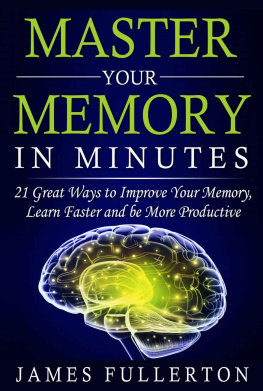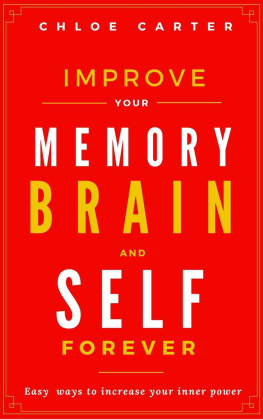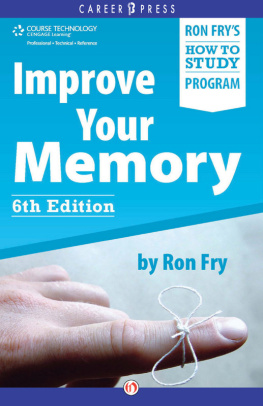This book isdedicated to my family whose unyielding support gave me the drive to get thingsdone no matter how difficult the process may be.
Chapter 1- Memory- What is it and Why is it So Important?
There are a variety of definitionsfor memory; lets look at the most common meanings.
Memory is defined as "theability to store and retain information from daily experiences; archive thisinformation in folders for use at a later date."

There are different types of memoryour brain can store, they are:
1. Short term
2. Long term
3. Sensory
4. Explicit
5. Implicit
6. Episodic
7. Semantic
Your short term memory, also knownas "working memory," is the type of memory we use most often. Thispart of our memory bank is used for daily functions such as calculations,writing letters, conversations, and onetime events. The impact a particularexperience has on us also determines how long we remember things.
If you're involved in a car accidentor robbery; these are situations that greatly impact the victims and will stickin their memories for a very long time.
Recall - when talking about whatmemory is, we must include recall as part of the definition. Its one thing toretain information and it is another to extract it from the memory banks. Thistwo part process is what makes memory a vital part of learning.
Sensory Memory - sight, smell,hearing, and touch are all forms of sensory memory. Again, the impact each experiencehas on you determines how long you will retain the memory. For example, if youwent to a restaurant and had a really fantastic meal, this would have apositive impact on you that could last for a long time. The opposite could alsobe true, and in this case your recall mechanism kicks in reminding you ofrestaurants you don't want to revisit again.
Why is Your Memory Important?
Memory and Learning - this is one ofthe main reasons memory is so important. Imagine having to ask the samequestion over and over again because you cannot remember the answer. Therewouldn't be the progress and development in technology we see today. Everythingwe do is based on memory. You have to remember how to get home from work. Doyou remember how to get to your friends house? How about the weddinganniversary? Forgetting this can cause a lot of tension in your life.
Memory and Making a Living - peopledon't connect the two - memory and work. You must depend on your memory, bothshort and long term, to perform daily functions. Yes, you can write things downin lieu of having to remember them but imagine the time it would take to dodaily tasks. If anything, you should be increasing your memory capacity andreducing your dependency on lists for routine jobs.
Pain and Pleasure - memory isimportant so we can avoid those things causing us pain and continue with thosethings that give us pleasure. One of the best examples is in the food category.Everybody likes to eat sweets, but not everyone can process the glucose properlyand the end result is a big, fat headache. So when the next urge for sweetshits, hopefully the memory of the pain that follows will deter that person fromindulging. The reality is - even with the memory of pain, the urge sometimesstill wins.
Memory and Skills - this type ofmemory is in conjunction with learning, but it is more specific to a skill. Oneof the best examples is sports. Playing basketball requires a lot of hours ofpractice, practicing plays and repetitive shooting exercises. The purpose ofpracticing shots hundreds, if not thousands of times, is to build a reactivememory. In a game situation the player doesn't have time to think about theshot, they just have to react. This is the whole purpose of practicing -building a memory to master a particular skill.
This type of memory applies to mostsports such as golf, tennis, baseball, soccer, and hockey.
Memory and Survival - this type ofmemory is right up there with learning except we're talking about "loss ofmemory." It is vital for our survival to remember to do things. Believe itor not, some people forget to eat and become nutritionally starved. There aretoo many stories of people who forget to turn off the stove and burn down theirhouse - sometimes the results can even be more fatal. The medical terms forthis type of degenerative memory loss is referred to as "Dementia andAlzheimer's."
Exercising Your Memory
Keeping your memory in shape is justas important as keeping your body fit. There are memory techniques you can usesuch as "pegging," and there are games you can play to exercise yourbrain like "pairs."
In a world where we havecalculators, computers that spell check, and electronic gadgets that keep trackof everything we don't want to remember, we are relinquishing our capacity ofmemory. As you have read, you use your memory in every aspect of your life.Have you heard the old saying "if you don't use it you will lose it?"Well, this also applies to your memory.
This is why it's important toexercise and expand the capacity of your memory and not let modern conveniencesreplace the need for memory. People have been mislead into thinking that memoryloss is a natural digression, but we know of people in their 90's that are justas sharp as they were 30 years ago. What's the secret? Well, there are threethings we see they have in common - they are:
1. Reading
2. Puzzles (crossword)
3. Nutrition
These elders read a lot, they dopuzzles daily, and they are very particular about their diet. They didn't juststart doing these things when they hit ninety; they incorporated these habitsinto their lifestyles many years earlier.
Your memory is vitally important forsurvival and quality of life. If you do some of the simple things to keep itfit now, your memory will serve you well throughout your lifetime.
Chapter 2- The Advantages ofBoosting Memory
It is important to have a strongmemory since it is important to your health and your brains vitality. Whetheryou are a high school or college student who is studying for finals, a workingperson who is concerned about maintaining mental sharpness, or an elderlyperson who is searching for ways to preserve their gray matter in the agingprocess, you can improve your mental performance along with keeping your memorysharp.




